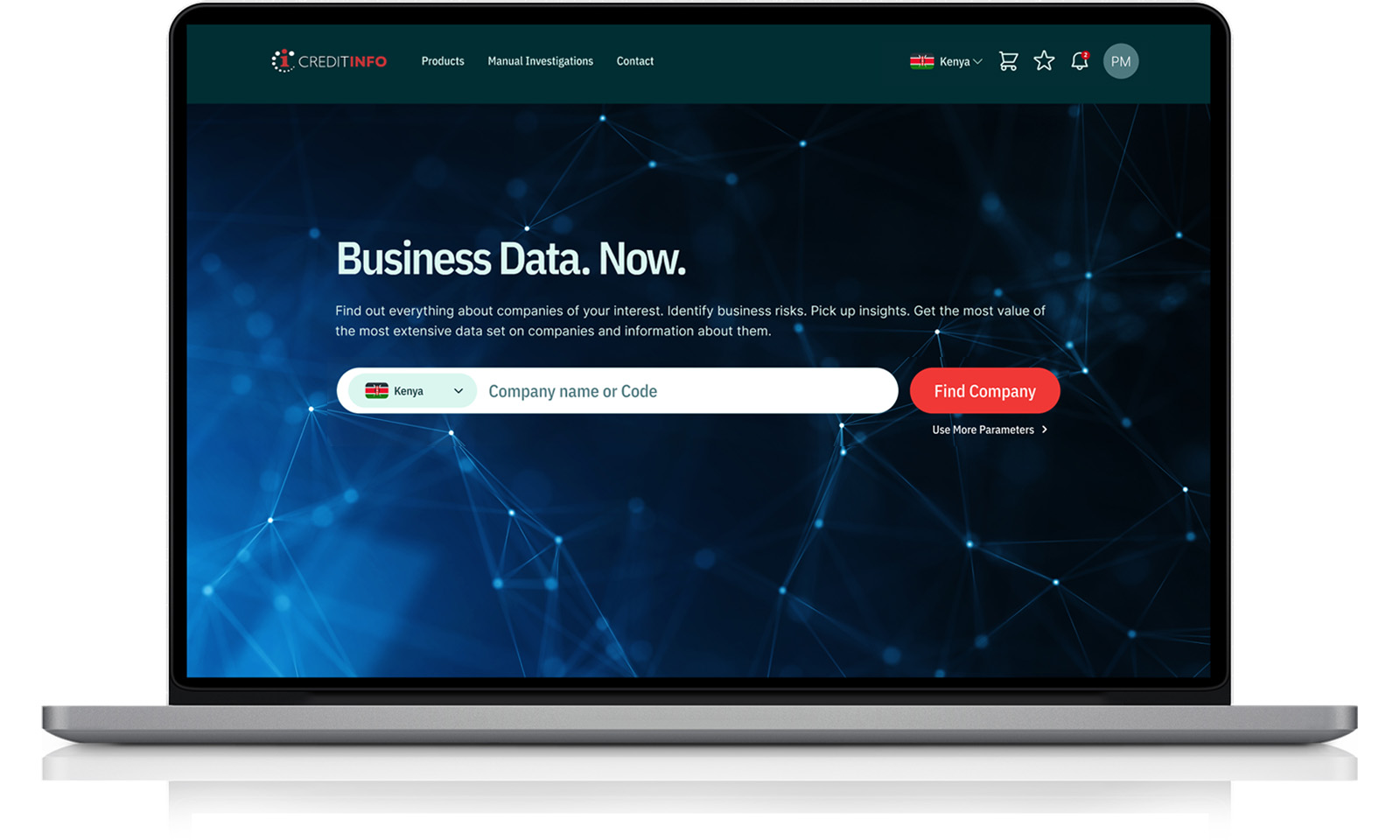Frequently Asked Questions
A credit reference bureau (CRB) is a firm that collects information from financial institutions and provides consumer credit information on individual consumers for a variety of uses. CRBs hold credit data shared by financial institutions and facilitate credit lending to financial institutions.
A data provider means a person, business, or government agency providing credit information to a credit reference bureau. In Kenya the credit data providers mandated by the CBK to submit data to the CRBs are Banks, Micro Finance Banks(MFBs), Saccos, and a few Micro Finance Institutions (MFIs)
The data subject is an individual or a business entity whose data could be collected, processed, and disclosed to third parties in the credit information sharing system.
Monthly basis credit information on all existing and new credit facilities granted to a person(borrower) by the banks, financial institutions, and other institutions authorized by the Bank (CBK).
A listing is a positive or negative record of your credit information that is submitted to CRBs by financial institutions.
CRB receives both positive and negative listings. Positive means a loan that is being serviced (loan repayment is consistent) and Negative means a loan that went into default (no payments).
It takes 90 days for banks and 30 days for mobile lenders after which individuals are notified that they are going to be listed if they don’t make any payment on their loan.
Credit listing is an individual’s credit profile that is shared by the financial institutions while credit rating is the evaluation done by financial institutions on an individual to determine his/her ability to pay back a loan and chances of default.
The Financial Institution updates both the Positive and Negative listings in the CRB. These can include but are not limited to Banks, Microfinance Banks, Microfinance Institutions, Digital Lenders, and Saccos. Credit listing is an individual’s credit profile that is shared by the financial institutions while credit rating is the evaluation done by financial institutions on an individual to determine his/her ability to pay back a loan and chances of default.
When a Financial Institution needs to update a customer’s details to Creditinfo CRB, they generate a unique identifying code called a batch number. This batch number allows the institution to easily track and manage the information they have submitted to the CRB. The Batch number also confirms to the client that their update information has been shared with the CRB.
The Financial Institution issues the batch numbers to their customers
When a customer clears their loan, it takes the financial institution up to three working days to update Creditinfo Credit Reference Bureau (CRB) with this information. Following this, Creditinfo takes around two to three working days to update the status of the loan accordingly. It’s important to bear in mind that these timeframes can vary slightly depending on the specific Financial Institution.
What information is prohibited as credit information to be stored, shared, or processed in the Credit Reference Bureau?
- positive balances on cheques, savings, and time deposit accounts;
- a person’s political affiliation;
- a person’s medical status or history;
- a person’s religion or philosophical beliefs;
- a person’s sexual orientation, except to the extent that such information is self-evident from the record of the natural person’s marital status and list of family members;
- and a person’s membership of a trade union, except to the extent that such information is self-evident from the record of the natural person’s employment information.
For what purpose does the Credit Reference Bureau use the information?
- Sale of credit information in the form of credit reports to a data subject, data providers, and other entities within Kenya
- Retention period purpose; Credit Reference Bureau retains credit information maintained in its database until the expiry of 5 years from the date of final loan repayment assignment or written-off and bankruptcy data will be kept for 7 years from the date of discharge.
- Public awareness purpose; in conjunction with all data providers, the Credit Reference Bureau maintains a program of public awareness relating to the rights and protection of the data subject.
Credit Report
A credit report means information issued by a credit reference bureau containing all or part of the data subjects’ credit history.
– Consumer Credit Reports
– Business Credit Reports
– Credit Scores
This is a report divulging any or all of the pertinent demographic and credit data contained in the main database in respect of a specified individual.
How can customers can access their credit reports:
- Every individual is entitled to 1 free report every calendar year.
- You can access your Personal Credit report or Company Credit report by clicking the button below.
Creditinfo Monitoring
Creditinfo also offers monitoring for its consumers. This is a paid service on a subscription basis. This service alerts the consumer via email when new information is reported on their profile or their report is accessed. This is to assist in managing fraud incidents and protecting the consumer’s bureau profile from erroneous information being reported.
Clearance Certificate
A clearance certificate is issued upon request, either when requested by Financial Institution; Job Application; Or it’s a requirement for Tender application etc.
A Certificate is just a confirmation of the current credit status and does not clear your current or historical debts. The payment for the Clearance Certificate will not hide or improve your credit history. The financial institutions will still see the history of your payments and make their loan decision based on your credit history regardless if you have paid for the Clearance Certificate.
You don’t pay the CRB any amount to get clearance; you only need to clear with the institution that listed you, they are the only ones that can clear you. Please note that clearance here means that they will update your account to zero balance to show that you have cleared the amount owed to them.
The Kshs.2200 is the processing fee for a Clearance Certificate and not a fine to clear your name on CRB.
A default listings retained on CRB for 5 years from the last date of payment.
You can apply for a Personal Clearance Certificate or Company Clearance Certificate by clicking the button below.
Data Submissions and Update
Depending on the institution’s policies update on a loan can be done 24 hours, 48hours, end of every week, or monthly.
Monthly
- Credit Reference Bureau (CRB) regulations require that customer data is submitted to the bureau at least once a month.
- This data is submitted to all licensed bureaus by the 10th of every month.
- The bureau then has up to the 15th of every month to load to its live environment.
Daily Updates
- Banks provide an updated position to customer data as and when there is a change. These updates are typically sent to CRB 2-3 days after a customer has made a payment
- To fast track the update process, customers can ask the bank to send the update
- Updates received by CRB are updated by end of the day received. Any updates received after 3:30 pm would be applied by 10.00 am the following working day
Note:
- Data submission at the bank level is usually handled by the Credit teams. However, this varies from bank to bank.
- ***In certain instances, we do receive payment updates within the month from the banks on a client who has completed payments on their facilities. These are updated and confirmation is sent to the email of the client, on the update.
The best approach is to visit the bank that listed you and request them to update your records with CRB. One also has the option of filing a dispute with CRB.
By filing a dispute with the bureau then the bureau gets in touch with the listing institution and submits the dispute with them because they are the ones that submitted the information to the bureau so it’s up to them to change the information.
Yes, it can be corrected but please note that a credit score is comprised of different variables, not just a negative listing. Also, it may take a few weeks before it re-calibrates to capture the changes in the different variables to update to the new score.
Yes, they are. Before a negative listing is submitted to a credit bureau the financial institution gives the client a 30day notice that they will be listed on CRB. This is meant to give the client time to pay up the outstanding amount or to visit the bank to organize a payment arrangement if they are unable to offset the whole amount.
How can customers correct/clean up their credit history?
- Customers can go to the bank and ask them to correct the disputed details then request for the update to be sent to the bureau immediately
- If the customer disputes any of the information on the report they raise the issue with CIK Consumer Care who follows up with the respective bank.
- Customers’ credit report is updated with information sent through by the respective bank and sent to an email address as provided during the credit report request process.
- If the respective bank does not respond within 14 days to the dispute raised by the client. The bureau deletes the disputed information from the report and the updated report is sent to the customers’ email address as provided during the credit report request process
How can customers inquire or seek guidance with respect to the interpretation of their credit reports?
- Customers can call our consumer care desk on +254709593000 between 8.00 am and 5.00 pm Monday to Friday
- Customers can also reach CIK via email through consumercare@creditinfo.co.ke
Credit Score
Credit score, customer rating, or Creditinfo Predictor provides a single assessment of the customer’s risk profile. It is presented by a number from 250 to 900 which is accompanied by a grade ranging from A to E. The higher the score the lower the risk. This means the higher your credit score the better chances you have at being offered a credit facility and a better rate than an individual with a low credit score.
Credit score, customer rating, or Creditinfo Predictor is computed based on past repayment behavior e.g. have you missed a payment and for how long, level of indebtedness.
| Risk Grades | Credit Score | Description | |
| A1 | 743 to 900 | Very Low Risk | |
| A2 | 731 to 742 | Very Low Risk | |
| A3 | 713 to 730 | Very Low Risk | |
| B1 | 701 to 712 | Low Risk | |
| B2 | 689 to 700 | Low Risk | |
| B3 | 677 to 688 | Low Risk | |
| C1 | 665 to 676 | Average Risk | |
| C2 | 653 to 664 | Average Risk | |
| C3 | 641 to 652 | Average Risk | |
| D1 | 620 to 640 | High Risk | |
| D2 | 604 to 619 | High Risk | |
| D3 | 574 to 603 | High Risk | |
| E1 | 530 to 573 | Very High Risk | |
| E2 | 251 to 529 | Very High Risk | |
| E3 | 250 | Very High Risk | |
| XX | MISSING | Excluded from Scoring | |
A good credit score doesn’t automatically guarantee you a loan. Financial institutions have different processes of assessing someone for a credit facility. One organization may grant you a loan and another may not. Maintaining a credit score of above 650, repaying your credit on time, and ensuring that you don’t default on a credit facility increases your chances of loan approval.
What are soft and hard inquiries and how do they affect my score? For every loan application, you make, credit lenders normally make a hard inquiry on your credit history from a CRB, this tends to affect your score while a soft inquiry is when you personally inquire about your personal credit history from a CRB, this, however, doesn’t affect your credit score.
When you frequently make loan applications from different institutions this causes hard inquiries that negatively affect your score.
What can you do to improve your credit history?
- Check Your Credit Report and Fix errors: To improve your credit history start with correcting any errors on your credit report. If you haven’t already, request a free copy of your credit report and check it for errors.
- Pay your bills on time: Overdue payments, even if only a few days late can have a major negative impact on your credit history. If you have missed payments, get current and stay current: The longer you pay your bills on time after being late, the more your credit history should improve.
- Setup Payment Reminders: Making your credit payments on time is one of the biggest contributing factors to an improved credit profile.
- Subscribe to monitoring: Creditinfo will assist you on a monthly basis to stay up to date with your credit information as reported to the bureau by your credit providers.








